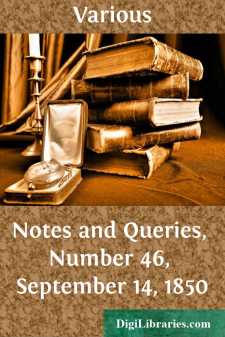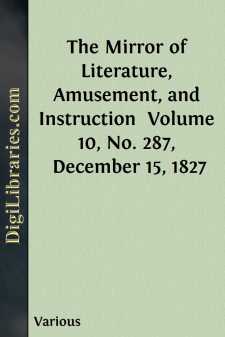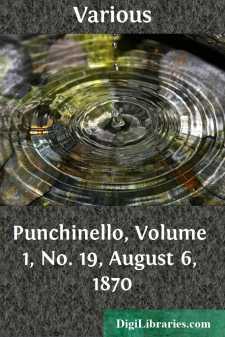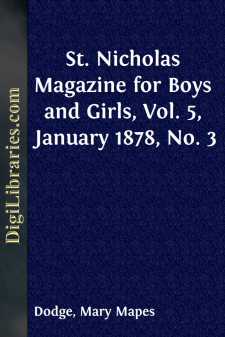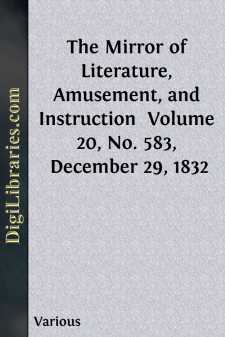Periodicals
- Art 27
- Children's periodicals 59
- Entertainment 5
- Food/Wine 2
- Games/Humor 455
- General 661
- Health 1
- History 53
- House/Home 1
- Regional 62
- Science/Nature 118
- Transportation 10
Periodicals Books
Sort by:
by:
Various
NOTES. THE MEANING OF "DRINK UP EISELL" IN HAMLET. Few passages have been more discussed than this wild challenge of Hamlet to Laertes at the grave of Ophelia: "Ham. I lov'd Ophelia! forty thousand brothers Could not, with all their quantity of love, Make up my sum. What wilt thou do for her? —Zounds! show me what thou'lt do? Woo't weep? Woo't fight? Woo't fast?...
more...
by:
Various
HISTORICAL FACTS RELATIVE TO THE EARLY CONDITION OF THE ENGLISH.(For the Mirror.)London, in early times (King Ethelred's reign) consisted only of scattered buildings from Ludgate to Westminster, and none where the heart of the city now is; it was afterwards extended more westward and continued increasing—-eastward being neglected until a more later period. Who can view its present well...
more...
by:
Various
MODERN TYPES. (By Mr. Punch's own Type Writer.) No. XVI.—THE HURLINGHAM GIRL. It is not so easy as it might appear to define the Hurlingham Girl with complete accuracy. To say of her that she is one whose spirits are higher than her aspirations, would be true but inadequate. For, at the best, aspirations are etherial things, and those of the Hurlingham Girl, if they ever existed, have been so...
more...
by:
Various
THE HUGUENOTS OF NEW ROCHELLE. It is worthy of record that Westchester County, New York, was settled by emigrants from New England and France, and both seeking homes from religious persecutions. As early as 1642, John Throcmorton, with thirty-five associates, made the first settlement in this section, with the approbation of the Dutch authorities. With Roger Williams, driven away from New England by...
more...
by:
Various
THE MYSTERY OF MR. E. DROOD. AN ADAPTATION. BY ORPHEUS C. KERR. CHAPTER XIIвÐâ(Continued.) The pauper burial-ground toward which they now progress in a rather high-stepping manner, orвÐâto vary the phraseвÐâtoward which their steps are now very much bent, is not a favorite resort of the more cheerful village people after nightfall. Ask any resident of Bumsteadville if...
more...
The most important news of the past week is the step which Great Britain has taken in breaking off the commercial treaties with Germany and Belgium, which have been in effect since 1865. By the terms of these treaties, Great Britain gave her word that no articles manufactured in either of these countries should be charged higher tariff duties in her colonies than similar articles of British...
more...
by:
Mary Mapes Dodge
THE RAVENS AND THE ANGELS. (A Story of the Middle Ages.) By the Author of "Chronicles of the Schönberg-Cotta Family." I. In those old days, in that old city, they called the cathedral—and they thought it—the house of God. The cathedral was the Father's house for all, and therefore it was loved and honored, and enriched with lavish treasures of wealth and work, beyond any other...
more...
by:
Various
NATURAL TUNNEL, IN VIRGINIA. Rock Bridges occupy the same pre-eminence amongst the sublimities of nature, that artificial bridges maintain amidst the labours of man. Both alike inspire us with admiration, though we are enabled to obtain but unequal results as to their respective origins. The bridge, built by human hands, is, indeed, a triumph of the perfection of skilful contrivance; the strength and...
more...
by:
Various
OUR LADY'S CHAPEL, ST. SAVIOUR, SOUTHWARK. The Engraving represents the interior of the Virgin Mary's Chapel, commonly called the Lady Chapel, and appended to the ancient collegiate church of St. Saviour, Southwark. The exterior view of the Chapel will be found in No. 456 of The Mirror. About eighteen months since part of the western side of the High-street was removed for the approach to the...
more...
by:
Various
THE PRINCESS ELIZABETH'S COTTAGE, WINDSOR. They who draw their notions of royal enjoyment from the tinsel of its external trappings, will scarcely believe the above cottage to have been the residence of an English princess. Yet such was the rank of its occupant but a few years since, distant as may be the contrast of courts and cottages, and the natural enjoyment of rural life from the artificial...
more...


